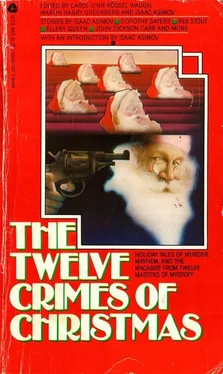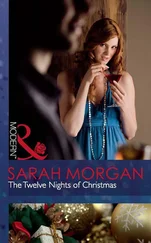Carol-Lynn Waugh - The Twelve Crimes of Christmas
Здесь есть возможность читать онлайн «Carol-Lynn Waugh - The Twelve Crimes of Christmas» весь текст электронной книги совершенно бесплатно (целиком полную версию без сокращений). В некоторых случаях можно слушать аудио, скачать через торрент в формате fb2 и присутствует краткое содержание. Жанр: Триллер, на английском языке. Описание произведения, (предисловие) а так же отзывы посетителей доступны на портале библиотеки ЛибКат.
- Название:The Twelve Crimes of Christmas
- Автор:
- Жанр:
- Год:неизвестен
- ISBN:нет данных
- Рейтинг книги:3 / 5. Голосов: 1
-
Избранное:Добавить в избранное
- Отзывы:
-
Ваша оценка:
- 60
- 1
- 2
- 3
- 4
- 5
The Twelve Crimes of Christmas: краткое содержание, описание и аннотация
Предлагаем к чтению аннотацию, описание, краткое содержание или предисловие (зависит от того, что написал сам автор книги «The Twelve Crimes of Christmas»). Если вы не нашли необходимую информацию о книге — напишите в комментариях, мы постараемся отыскать её.
The Twelve Crimes of Christmas — читать онлайн бесплатно полную книгу (весь текст) целиком
Ниже представлен текст книги, разбитый по страницам. Система сохранения места последней прочитанной страницы, позволяет с удобством читать онлайн бесплатно книгу «The Twelve Crimes of Christmas», без необходимости каждый раз заново искать на чём Вы остановились. Поставьте закладку, и сможете в любой момент перейти на страницу, на которой закончили чтение.
Интервал:
Закладка:
“Hey,” said Sergeant Velie, staring.
“Son,” began Inspector Queen, half-rising from his armchair; when the telephone rang.
“Beautiful!” roared Ellery. “Oh, exquisite! How did Comus make the switch, eh? Nikki-”
“From somewhere,” said Nikki, handing him the telephone receiver, “a voice is calling, and if you ask me it’s saying ‘Comus.’ Why not ask him?”
“Comus,” whispered the inspector, shrinking.
“Comus,” echoed the sergeant, baffled.
“Comus?” said Ellery heartily. “How nice. Hello there! Congratulations.”
“Why, thank you,” said the familiar deep and hollow voice. “I called to express my appreciation for a wonderful day’s sport and to wish you the merriest kind of Yule tide.”
“You anticipate a rather merry Christmas yourself, I take it.”
“Laeti triumphantes,” said Comus jovially.
“And the orphans?”
“They have my best wishes. But I won’t detain you, Ellery. If you’ll look at the doormat outside your apartment door, you’ll find, on it-in the spirit of the season-a little gift, with the compliments of Comus. Will you remember me to Inspector Queen and to Attorney Bondling?”
Ellery hung up, smiling.
On the doormat he found the true Dauphin’s Doll, intact except for a contemptible detail. The jewel in the little golden crown was missing.
“IT WAS,” said Ellery later, over pastrami sandwiches, “a fundamentally simple problem. All great illusions are. A valuable object is placed in full view in the heart of an impenetrable enclosure, it is watched hawkishly by dozens of thoroughly screened and reliable trained persons, it is never out of their view, it is not once touched by human hand or any other agency, and yet, at the expiration of the danger period, it is gone-exchanged for a worthless copy. Wonderful. Amazing. It defies the imagination. Actually, it’s susceptible-like all magical hocus-pocus-to immediate solution if only one is able-as I was not-to ignore the wonder and stick to the fact. But then, the wonder is there for precisely that purpose: to stand in the way of the fact.
“What is the fact?” continued Ellery, helping himself to a dill pickle. “The fact is that between the time the doll was placed on the exhibit platform and the time the theft was discovered no one and no thing touched it. Therefore between the time the doll was placed on the platform and the time the theft was discovered the dauphin could not have been stolen. It follows, simply and inevitably, that the dauphin must have been stolen outside that period.
“Before the period began? No. I placed the authentic dauphin inside the enclosure with my own hands; at or about the beginning of the period, then, no hand but mine had touched the doll-not even, you’ll recall, Lieutenant Farber’s. Then the dauphin must have been stolen after the period closed.”
Ellery brandished half the pickle. “And who,” he demanded solemnly, “is the only one besides myself who handled that doll after the period closed and before Lieutenant Farber pronounced the diamond to be paste? The only one?”
The inspector and the sergeant exchanged puzzled glances, and Nikki looked blank.
“Why, Mr. Bondling,” said Nikki, “and he doesn’t count.”
“He counts very much, Nikki,” said Ellery, reaching for the mustard, “because the facts say Bondling stole the dauphin at that time.”
“Bondling!” The inspector paled.
“I don’t get it,” complained Sergeant Velie.
“Ellery, you must be wrong,” said Nikki. “At the time Mr. Bondling grabbed the doll off the platform, the theft had already taken place. It was the worthless copy he picked up.”
“That,” said Ellery, reaching for another sandwich, “was the focal point of his illusion. How do we know it was the worthless copy he picked up? Why, he said so. Simple, eh? He said so, and like the dumb bunnies we were, we took his unsupported word as gospel.”
“That’s right!” mumbled his father. “We didn’t actually examine the doll till quite a few seconds later.”
“Exactly,” said Ellery in a munchy voice. “There was a short period of beautiful confusion, as Bondling knew there would be. I yelled to the boys to follow and grab Santa Claus-I mean the sergeant, here. The detectives were momentarily demoralized. You, Dad, were stunned. Nikki looked as if the roof had fallen in. I essayed an excited explanation. Some detectives ran; others milled around. And while all this was happening-during those few moments when nobody was watching the genuine doll in Bondling’s hand because everyone thought it was a fake-Bondling calmly slipped it into one of his greatcoat pockets and from the other produced the worthless copy which he’d been carrying there all day. When I did turn back to him, it was the copy I grabbed from his hand. And his illusion was complete.
“I know,” said Ellery dryly, “it’s rather on the let-down side. That’s why illusionists guard their professional secrets so closely; knowledge is disenchantment. No doubt the incredulous amazement aroused in his periwigged London audience by Comus the French conjuror’s dematerialization of his wife from the top of a table would have suffered the same fate if he’d revealed the trap door through which she had dropped. A good trick, like a good woman, is best in the dark. Sergeant, have another pastrami.”
“Seems like funny chow to be eating early Christmas morning,” said the sergeant, reaching. Then he stopped. Then he said, “Bondling,” and shook his head.
“Now that we know it was Bondling,” said the inspector, who had recovered a little, “it’s a cinch to get that diamond back. He hasn’t had time to dispose of it yet. I’ll just give downtown a buzz-”
“Wait. Dad” said Ellery.
“Wait for what?”
“Whom are you going to sic the hounds on?”
“What?”
“You’re going to call headquarters, get a warrant, and so on. Who’s your man?”
The inspector felt his head. “Why… Bondling, didn’t you say?”
“It might be wise,” said Ellery, thoughtfully searching with his tongue for a pickle seed, “to specify his alias.”
“Alias?” said Nikki. “Does he have one?”
“What alias, son?”
“Comus.”
“Comus!”
“Comus?”
“Oh, come off it,” said Nikki, pouring herself a shot of coffee, straight, for she was in training for the inspector’s Christmas dinner. “How could Bondling be Comus when Bondling was with us all day?-and Comus kept making disguised appearances all over the place…that Santa who gave me the note in front of the bank-the old man who kidnapped Lance Morganstern-the fat man with the mustache who snatched Mrs. Rafferty’s purse.”
“Yeah,” said the sergeant. “How?”
“These illusions die hard,” said Ellery. “Wasn’t it Comus who phoned a few minutes ago to rag me about the theft? Wasn’t it Comus who said he’d left the stolen dauphin-minus the diamond-on our doormat? Therefore Comus is Bondling.
“I told you Comus never does anything without a good reason,” said Ellery. “Why did ‘Comus’ announce to ‘Bondling’ that he was going to steal the Dauphin’s Doll? Bondling told us that-putting the finger on his alter ego- because he wanted us to believe he and Comus were separate individuals. He wanted us to watch for Comus and take Bondling for granted. In tactical execution of this strategy Bondling provided us with three ‘Comus’ appearances during the day-obviously confederates.
“Yes,” said Ellery, “I think Dad, you’ll find on backtracking that the great thief you’ve been trying to catch for five years has been a respectable estate attorney on Park Row all the time, shedding his quiddities and his quillets at night in favor of the soft shoe and the dark lantern. And now he’ll have to exchange them all for a number and a grilled door. Well, well, it couldn’t have happened at a more appropriate season; there’s an old English proverb that says the Devil makes his Christmas pie of lawyer’s tongues. Nikki, pass the pastrami.”
Читать дальшеИнтервал:
Закладка:
Похожие книги на «The Twelve Crimes of Christmas»
Представляем Вашему вниманию похожие книги на «The Twelve Crimes of Christmas» списком для выбора. Мы отобрали схожую по названию и смыслу литературу в надежде предоставить читателям больше вариантов отыскать новые, интересные, ещё непрочитанные произведения.
Обсуждение, отзывы о книге «The Twelve Crimes of Christmas» и просто собственные мнения читателей. Оставьте ваши комментарии, напишите, что Вы думаете о произведении, его смысле или главных героях. Укажите что конкретно понравилось, а что нет, и почему Вы так считаете.












